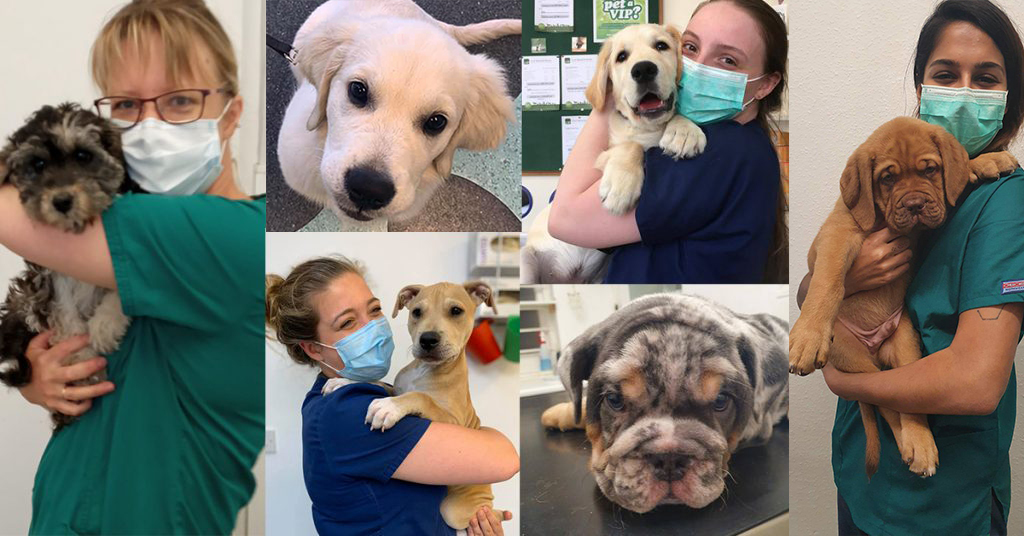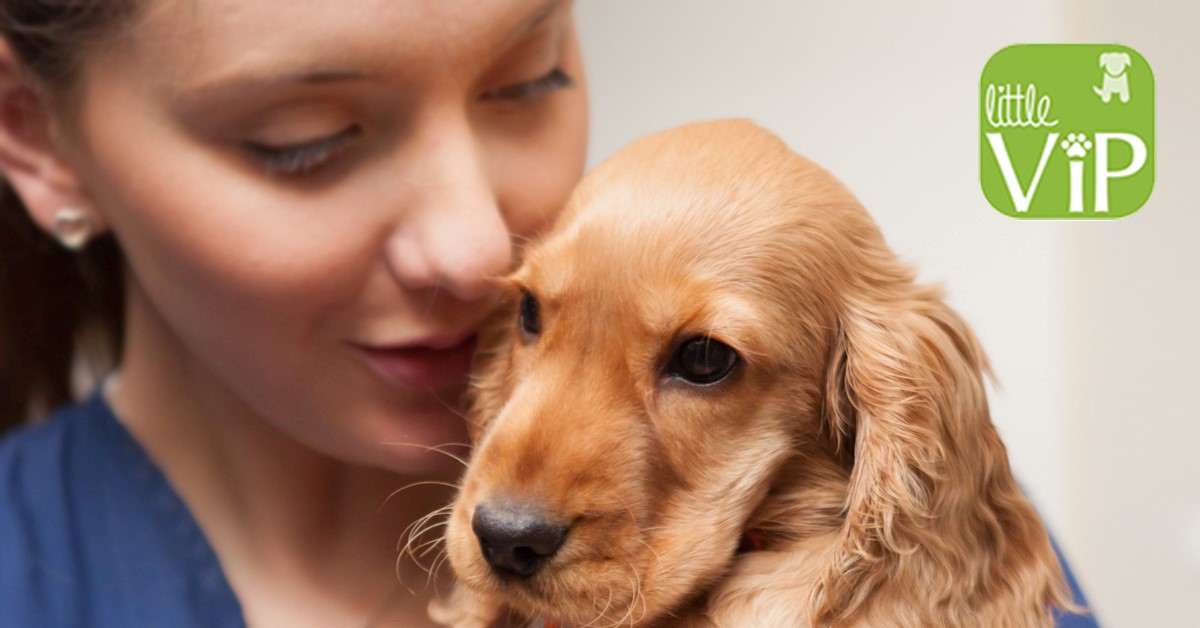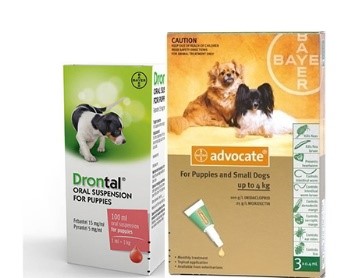
During the coronavirus crisis, we saw a massive increase in puppies being adopted, which has resulted in a puppy shortage across the UK. Welcoming a gorgeous new puppy into your family, is certainly very exciting and a source of great comfort during the lockdown, but it is also a great responsibility.
We have prepared the following guide to help you with everything from choosing the best puppy for you to ensuring you know everything they need to care for them. Read on to find out everything you need to know to keep your puppy healthy and happy!
Preparing to get a puppy
Puppies can be adorable, irresistible bundles of fun; however, they do need a lot of attention and a structured routine, which can be a bit hectic if your life is busy. There are several things for you to consider before getting a new puppy.
The best breed for you
Every dog has its own unique personality, however there are some instincts and behaviours that some breeds are born with. Are you a first time or seasoned dog owner? What kind of walks do you have in mind for you and your dog? Do you want fancy and bouncy or laidback and quiet?
Some breeds are great for first-time owners whereas some might need a more experienced pair of hands to understand their unique quirks and characteristics! Some breeds are more active and require several vigorous walks whilst others are more relaxed and need gentle walks. Make sure you choose a dog breed that suits your lifestyle and your routine so you can both enjoy your time together.
Health considerations
In recent years, we have seen an upward trend in the popularity of short nosed breeds (Brachycephalic breeds) such as pugs, bulldogs, boston terriers. These breeds are adorable, but please be aware of some of their potential health complications. Short-nosed breeds may suffer from a condition called brachycephalic syndrome, which is a worrying but common condition in those breeds that will need your immediate attention as sadly the signs are often picked up too late.
Breed Health Schemes
The British Veterinary Association (BVA) provides a lot of information about breeds and their potential health conditions such as hip and elbow dysplasia and eye deseases by offering dog health screening schemes for a number of known conditions in order to improve dog health and welfare. Research your breed and ask your breeder for the health scores of your puppy’s parents.
Large breeds such as Labradors, Rottweilers and Black German Shepherd Dogs can have joint and bone growth development issues so make sure to have the correct diet and growth. Each individual breed can have health predispositions, so we’d recommend you do your research on your preferred breed and call us for advice from our experienced team.
Where to get your puppy from
In April 2020, a ban on third-party puppy sales was established by the government called Lucy’s Law. Any puppy under six months must be sold directly by the breeder (or rehomed directly from a rehoming shelter). They must also be sold from the place they were born (with mum), which means you will be able to see the conditions the pups were raised in.
There are a lot of choices out there, but you need to know what to avoid and how to make the right choice. Across the UK, there are many welfare charities such as RSPCA, Dog’s Trust and Battersea Dogs where you could find many young dogs that need a loving family. If you choose to buy a puppy from a breeder, make sure you thoroughly research the breeders and check if the parents have completed all the relevant tests and screening procedures.
We would recommend choosing a breeder from the Kennel Club as these breeders must follow their extremely high standards and your puppy has a better chance of being healthy and happy for the rest of their lives.
We would not recommend getting a puppy from puppy farms, newspapers, or websites. These breeders do not have to follow any health guidelines to register their puppies, meaning the puppies could have underlying health issues.
Once you have chosen your puppy, get in touch with the breeder to arrange how to get your puppy home. Sometimes, the breeders can provide you with a blanket that has the mother’s smell on, a bag of food and crate to help you get your new family member settled in at home. Puppies usually have their first vaccination when they are 8 weeks and the microchip is usually done along with the first vaccine – under normal times, your puppy should have had the 1st vaccine and microchip from your breeder so speak with your breeder and ask for your puppy’s vaccine record and microchip details.
Preparing for your puppy
The first week you and your new dog spend together is exhilarating, certainly, but it’s also likely to be unnerving. Moving to a new home with a new family can cause stress for dogs, and it can certainly cause stress for you, too. You can make the transition easier on both of you by doing a little advanced planning. Before your new dog first set paw in your new home, it is important to plan ahead so that your new family member gets the best possible start in their new life.
Buy some of the basics ahead of time, so you and your dog can settle in nicely. To help them stay calm during the first stressful nights, you could try calming products such as Adaptil D.A.P collars and sprays. Your new puppy would appreciate some toys and chews and definitely buy some training pads and wet wipes to remove stains and odor.
Arrange a health check with the vet before you get your puppy to make sure you have everything planned. That first visit to the vet when you get the puppy is a great way to make sure everything is fine, check their preventatives are up to date and get them registered onto a healthcare plan.

Our VIP Healthcare plan for puppies covers everything your pet needs for the first year of his life from vaccination and flea and worm to health checks and food discounts. If you want to find out more about our Puppy Healthcare Plan, check out the video below in which our wonderful nurse, Lauren talks about preventative healthcare and how to keep them healthy and happy!
Caring for your new puppy
Getting a new puppy is such an exciting time, however, it can be a bit challenging particularly in the current climate. The first few days and weeks after your puppy’s arrival can make a lot of difference to how well they settle into your home and family. Here are our top tips so you can help your new family member to be as happy and healthy as possible.
Diet
Puppies can leave their mothers when around eight weeks old. Your puppy’s body is growing in critical ways which is why you will need to select a food that is formulated for puppies as opposed to adult dogs. Feed the diet they are used to at first, but make sure to speak with your vet first as diets provided by breeders are not always suitable for your puppy. Our vets would recommend a good quality diet such as Hills and Royal Canin. You might need to introduce a new food, but make sure to change it gradually and always use food suitable for the puppy’s breed and size. Our highly experienced team is always on hand to provide advice and diet recommendations tailored to your little friend’s needs.
Please remember that several small meals are better than fewer large ones. Always make sure fresh water is available. Please follow your vet’s instructions when feeding, and please keep a close eye to your puppy’s weight – obesity is a problem for dogs just as much as for humans.
Pet Insurance
We would recommend that you consider pet insurance but pay careful attention to the small print. It is essential to get insurance while your pet is healthy, as pre-existing conditions won’t be covered. Lifetime insurance may be worthwhile, as some 12-month policies will exclude conditions for which a claim has been made when the policy comes up for renewal and don’t forget to look at the ’excess’ (the amount of each claim which you have to pay).
Sometimes the breeder is able to provide you with insurance for your puppy, however, at DNA Vetcare, we are offering five weeks free insurance for puppies, kittens and rabbits under six months of age. This will provide your pet with immediate cover for illness and injury. To find out more, call your surgery to speak with our friendly team or visit our website.
Illnesses to worry about
For the first few months, puppies are more susceptible to sudden bouts of illnesses that can be serious if not caught in the early stages. If you observe any of the following symptoms in your puppy, call our surgery to speak with our experienced vets:
- Lack of appetite
- Poor weight gain
- Vomiting
- Swollen of painful abdomen
- Lethargy (tiredness)
- Diarrhoea
- Difficulty breathing
- Wheezing or coughing
- Pale gums
- Swollen, red eyes or eye discharge
- Nasal discharge
- Inability to pass urine or stool
Health Checks At Home
A quick health check at home is a great way to find any underlying issues and make sure your pet is in tip-top shape. In the video below, our senior vet Dane talks through how to do a check up on your puppy. If you have any worries, then call us so that we can help you.
Please make sure to regularly check your puppy’s nails as they can get sharp so they might need a trim. Please do not attempt to clip your pet’s nails as sometimes it can cause many nasty injuries. Give us a call and we can book you in.
Free Puppy Advice – Our wonderful nurses are available for free video consults to give you advice and recommendations on your puppy’s diet, flea and worm treatment, healthcare issues and everything else you might need. Just call our surgery or book your free video consult online. Before Covid-19 crisis, we were also offering free puppy health checks in the surgery, but as the restrictions start to ease, we will resume them in no time. Keep an eye on our Facebook page to get all the updates.
Fleas and Worms

Fleas are a very common problem and once you have a flea infestation, it can be very difficult to get rid of the problem. These blood sucking parasites cause a multitude of problems for your pets from skin allergies to mouth ulcers and they can also carry worms and may even bite you! Alarmingly flea eggs and larvae can live in the house for up to 18 months and can provide a reservoir for infestation if not treated appropriately.
Fleas are the most well-known offenders, but they are only a small part of the picture. Other common parasites include mites and worms such as tapeworm and lungworm which can be fatal if not treated. Dogs pick up worms from their mothers via the placenta and their milk, other pets, eating slugs and snails and by coming into contact with the faeces of other animals. There are several types of worms that will cause disease ranging from weight loss to severe life-threatening diarrhoea. Roundworm and some types of tapeworm can be passed on to people, particularly children, and can cause disease and even blindness.
Treating your pet regularly for fleas, ticks and worms will save you and your puppy from a lot of discomfort and stress. Please only use products recommended by your vet. Flea and worming products available over the counter are often ineffective and do not treat for dangerous parasites such as Lungworm, ear mites and mange.
Vaccinations
Once they are settled into their new home, book an appointment with your vet to take care of any outstanding vaccinations.
We recommend that all puppies are vaccinated at 8 and 10 weeks of age and kittens should be vaccinated at 9 weeks and 12 weeks. Vaccinations are a particularly important part of routine care for your pet to protect them against some potentially lethal diseases such as parvovirus, leptospirosis and distemper for dogs and cat flu for cats. Unfortunately, over the past year, we have seen quite a few cases of parvovirus, leptospirosis, and cat flu. Kennel Cough is recommended for most puppies as they can get this respiratory disease not only from kennels but also from encountering other puppies. Our VIP Healthcare Plan ensures your pet is covered from all vaccinations and Kennel Cough. Speak to one of our friendly team to sign up to our exclusive money saving Little VIP Plan.
After the second vaccination, puppies can start going out in the world and socializing with other dogs. Training classes like the puppy parties we organize at our Streatham Hill branch, are especially important for your puppy’s socialization and behavioural growth. Unfortunately, due to the Covid-19 crisis, most puppy classes have been cancelled, however there are some incredibly good books that we would recommend such as Easy Peasy Puppy Squeezy: your simple guide to raising and training a happy puppy, by Steve Mann, or even virtual training courses with a behaviour expert.
Neutering
Usually, most dogs can be neutered or spayed after 6 months of age. All female dogs not intended for breeding should be neutered to prevent or reduce the risk of many potentially serious diseases. Neutering can protect your pets not only from unwanted pregnancies but can also prevent tumours and reduce the risk of a potentially fatal womb infection called Pyometra.
Not all male dogs need a neutering procedure, however if they become aggressive, agitated, or show undesirable sexual behavior, it is a good idea to have them neutered. Neutering does not change their character, but it will help calm them down.
Three of our hospitals in Kent and London can also carry out keyhole surgery which is a non-invasive neutering procedure that reduces the recovery time and post-op pain while keeping the risk of infections at a low rate. Keyhole Spay is a highly skilled procedure that has been used for male and female spay and organ biopsies. If you would like to know a bit more about this cutting-edge technology, please call Streatham Hill Vets, Briar House Vets or Blackheath Vets.
Dental Care
Puppies lose their milk teeth between 4 and 8 months of age, however at around 5 months there might be a retained K9 canine tooth, so it is always a good idea to check and contact us if you notice anything. Although you don’t have to worry about their milk teeth, it would be nice to focus on getting your dog used to having their mouth opened and touched, as this will help you to maintain their permanent teeth, which is vitally important as they get older. Please note that human toothpaste can be poisonous to dogs so always use an enzymatic canine toothpaste. These pastes come in different flavours that are appealing to dogs.
Microchip

A pet microchip is a tiny computer chip that is about the size of a grain of rice. It contains a unique code that matches up to your pet’s details. Microchipping a dog is a painless, quick and simple procedure. The chip is inserted under a dog’s skin, usually around the scruff of the neck, using a needle.
A microchip is a permanent form of identification and, if the details are kept up to date, you can always be contacted if your dog goes missing. Under the new microchipping law that came into effect on 6 April 2016, all dogs and puppies must be microchipped and registered by the age of eight weeks. Call our surgery and we can arrange an appointment to microchip your puppy in seconds.
Please be aware that the first 3-8 months can be tough as your puppy will need lots of attention and care but have a little patience and everything will gradually start becoming easier both for you and your pup. Please consider taking your puppy to doggy daycare or signing up to training classes as these will provide an excellent support in your pet’s growth and socialization. Our puppy parties are restarting soon so keep an eye on our Facebook page for more updates.
Finally enjoy your time together, puppies can bring real joy and it really does go by so fast! There will be challenges but expect and plan for that and if you need us, we are always here to help!
Search Blog Articles
Blog Categories
- Advice From Your Vets (118)
- Kittens (6)
- Pet Healthcare (26)
- Puppies (17)
- Seasonal Tips (10)
- VIP Healthcare Plans (8)
- Covid-19 News (15)
- Weekly News (63)
Like Us On Facebook
Recent Posts
Archives
- May 2024
- October 2023
- July 2023
- June 2023
- March 2023
- December 2022
- September 2022
- April 2022
- December 2021
- November 2021
- October 2021
- September 2021
- August 2021
- July 2021
- June 2021
- May 2021
- April 2021
- March 2021
- February 2021
- January 2021
- December 2020
- November 2020
- October 2020
- September 2020
- August 2020
- July 2020
- June 2020
- May 2020
- April 2020
- March 2020
- February 2020
- January 2020
- December 2019
- November 2019
- October 2019
- September 2019
- August 2019
- July 2019
- June 2019
Join our surgery by registering your pet online Register now
What Our Clients Say
Jack Billing
Byron Watson
Sharon And Michael
Amanda
Miss M And Dusty




